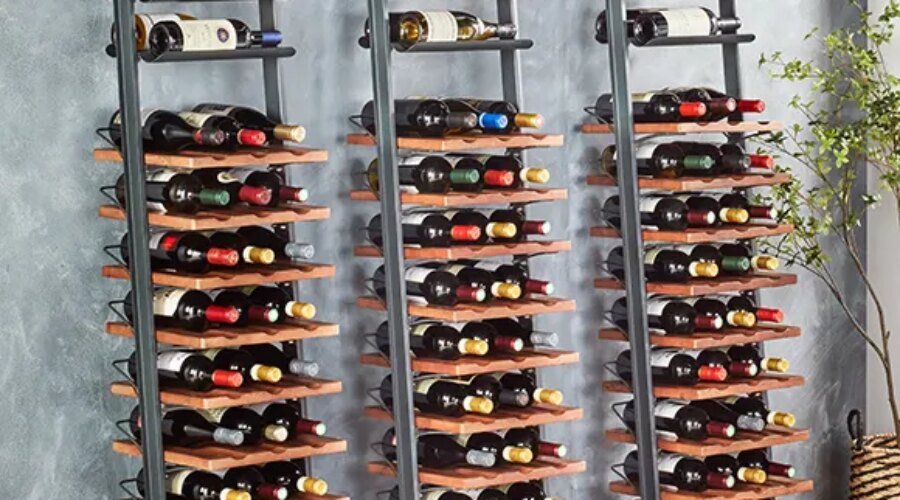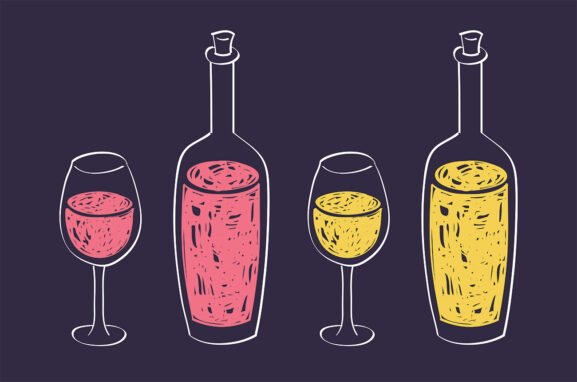Is Collecting Wine in a Fund (Instead of a Cellar) Sad or Smart?
Whether we’re talking about by-the-glass pours at restaurants or large collections at auction, wine’s value has traditionally been linked to the romance and mystique of terroir. Yet, this magical elixir, or nectar of the gods, also gains financial value over time—enough to earn a pretty penny (if stored and cared for properly).
For centuries, the ability to make money off a wine collection had been reserved for wine lovers of a certain ilk. This included either those with the means (i.e. cash) to buy coveted releases and stash them away in their home cellars for years, or the kinds of wine geeks who seek out cases of the new “it” wine, waiting with bated breath to see how it evolves over time. If these investments resulted in profits, great: but that was necessarily the driving force.
In recent years, however, a new wine investor class has emerged from the sidelines through a growing number of financial products. Much to the dismay of old-school wine lovers, these shareholders view wine less as a thrilling, quaffable collectible and more as—quelle horreur!—a commodity.
Is this the saddest way to collect wine? Or is it the smartest? We investigate.
The Shifting Forms of Investment
Growing and producing wine is a long game, requiring years to cultivate, harvest, ferment, and age before it’s even released. And then: more waiting.
To fully appreciate this liquid at its highest expression, wine lovers often buy and hold onto bottles, leaving them to rest in a cool, dark place after purchase. In time, some of these aged bottles can be sold for a nice profit.
This strategy has been employed for hundreds—arguably thousands—of years.
The first wine auction in the world is believed to have been held at Garraway’s Coffee House in London on February 20, 1673.
Nearly a century later, in 1766, the auction house that would become Christie’s made its inaugural sale, which included several cases of Bordeaux and Madeira wines.
// Create the element
var script_68dd87f90de38 = document.createElement(“script”);
script_68dd87f90de38.innerHTML = `
window.googletag = window.googletag || {cmd: []};
googletag.cmd.push(function() {
var adType = “leaderboard”;
var mapping;
var lbmapping = googletag.sizeMapping()
.addSize([1024, 0], [[970, 250], [970, 90], [1, 1], [728, 90]])
.addSize([728, 0], [[728, 90], [1, 1]])
.addSize([320, 0], [[1, 1], [300, 50], [300, 100], [320, 50], [320, 100]])
.addSize([0, 0], [[1, 1], [320, 50]])
.build();; // Size mapping for leaderboard ads
var medrecmapping = googletag.sizeMapping()
.addSize([1024, 0], [[300, 600],[300, 250]])
.addSize([728, 0], [300, 250])
.addSize([320, 0], [[1, 1],[300, 250]])
.addSize([0, 0], [[1, 1], [300, 250]])
.build(); // Size mapping for med rectengle ads
if(‘/39808611/article_page/article_leaderboard_1’ == ‘/39808611/article_page/article_leaderboard_1’
|| ‘/39808611/article_page/article_leaderboard_1’ == ‘/39808611/article_page/article_leaderboard_2’
|| ‘/39808611/article_page/article_leaderboard_1’ == ‘/39808611/article_page/article_leaderboard_3’) {
mapping = googletag.sizeMapping()
.addSize([1920, 0], [[728, 90]]) // >= 1920px
.addSize([1440, 0], [[728, 90]]) // 1440px-1919px
.addSize([730, 0], [[300, 250]]) // 730px-1439px
.addSize([0, 0], [[320, 100], [320, 50], [300, 100], [300, 50], [300, 250]]) // Up to 729px
.build();
} else {
mapping = adType == ‘leaderboard’ ? lbmapping : medrecmapping;
}
googletag.defineSlot(‘/39808611/article_page/article_leaderboard_1’, [],
‘div-gpt-ad-68dd87f90de38’).addService(googletag.pubads()).defineSizeMapping(mapping);
googletag.pubads().enableSingleRequest();
googletag.pubads().collapseEmptyDivs();
googletag.display(‘div-gpt-ad-68dd87f90de38’);
});
`;
// Append the script to the body
document.body.appendChild(script_68dd87f90de38);
Collecting wine, to be clear, has traditionally been the playground of either the very dedicated wine lover, or the very rich. In many cases, it falls into the center of a venn diagram of both.
Wine advisors have catered solely to these kinds of clientele, largely because of the cost of providing these services. There are still plenty of individuals and companies that still do.
“I won’t work with people who don’t actually plan to drink some of the wine they collect,” says Jason Hartman, president of The Sommelier Company, which advises private and corporate clients on wine collecting as an investment. “And I work with actual bottles of wine, not funds.”
In the vein of an old-school advisor, Hartman and his team help clients buy wines based on their needs and interests, and what the firm believes the best investment will be.
But, over recent decades, wine collection, for some, has become far more about profit than personal interest. In fact, people who don’t even drink wine are investing in wine funds, or purchasing stock in publicly traded wine companies.
“Wine investment funds are nothing new,” says David Parker, CEO of Napa’s Benchmark Wine Group, a leading source of rare and collectible wine. “They have existed for many decades. In many ways, distributors, importers, and brokers that have multiple owners or are publicly traded are themselves wine investment funds. There are more types of wine investment funds now than there have ever been.”
In addition to regular old mutual funds that seek investors, use that capital to invest in wineries, wine bottles, wine stocks, or other wine-adjacent assets like barrels, there are funds that welcome micro-investments in shares of high value bottles or collections of bottles.
The ROI of Wine Investing: Bottles vs. Stocks and Funds
Not all of these investments are created equal.
“While rare wine tends to appreciate in value in the long term and has demonstrated this for centuries, it tends to go through periods of quick appreciation followed by periods of adjustment that may manifest as a decline in value for many [of these cult, collectible] wines,” Parker says. “During those periods of fast appreciation, more wine mutual funds tend to be created and more individuals tend to invest.”
When the wine or stock markets readjust downwards, fewer new wine investment funds emerge, Parker notes, and investment in existing funds declines precipitously. Some close.
Dan Ahrens, managing director, COO, and portfolio manager of AdvisorShares, has personally overseen the most recent rise and decline in wine investments in the AdvisorShares VICE ETF fund.
“We launched it in December of 2017 with the idea that things like tobacco, alcohol, and gaming were recession-proof,” Ahrens says. “No matter what is going on in the economy, they did well.”
The fund, which is actively managed—meaning they can pick and choose stocks within their areas of interest, then divest when they predict a loss—now completely avoids alcohol.
“People are drinking less and less alcohol overall,” Ahrens says, alluding to the historic decline in wine consumption, with just 54% of Americans saying they drink alcohol according to Gallup, the lowest percentage in the survey’s 90-year history.
“Alcohol used to see a pattern of rotation between success for big beer and boxed wine when the economy was going through a difficult time, and then back to premium spirits and wine when the economy improved,” says Ahrens. “I’ve never seen the kind of decline we’re seeing now across the board in alcohol. There is nowhere to run and hide.”
So AdvisorShares began divesting in wine a few years ago. It holds no wine investments at the moment, and Ahrens has zero plans to change that.
// Create the element
var script_68dd87f90e616 = document.createElement(“script”);
script_68dd87f90e616.innerHTML = `
window.googletag = window.googletag || {cmd: []};
googletag.cmd.push(function() {
var adType = “leaderboard”;
var mapping;
var lbmapping = googletag.sizeMapping()
.addSize([1024, 0], [[970, 250], [970, 90], [1, 1], [728, 90]])
.addSize([728, 0], [[728, 90], [1, 1]])
.addSize([320, 0], [[1, 1], [300, 50], [300, 100], [320, 50], [320, 100]])
.addSize([0, 0], [[1, 1], [320, 50]])
.build();; // Size mapping for leaderboard ads
var medrecmapping = googletag.sizeMapping()
.addSize([1024, 0], [[300, 600],[300, 250]])
.addSize([728, 0], [300, 250])
.addSize([320, 0], [[1, 1],[300, 250]])
.addSize([0, 0], [[1, 1], [300, 250]])
.build(); // Size mapping for med rectengle ads
if(‘/39808611/article_page/article_leaderboard_2’ == ‘/39808611/article_page/article_leaderboard_1’
|| ‘/39808611/article_page/article_leaderboard_2’ == ‘/39808611/article_page/article_leaderboard_2’
|| ‘/39808611/article_page/article_leaderboard_2’ == ‘/39808611/article_page/article_leaderboard_3’) {
mapping = googletag.sizeMapping()
.addSize([1920, 0], [[728, 90]]) // >= 1920px
.addSize([1440, 0], [[728, 90]]) // 1440px-1919px
.addSize([730, 0], [[300, 250]]) // 730px-1439px
.addSize([0, 0], [[320, 100], [320, 50], [300, 100], [300, 50], [300, 250]]) // Up to 729px
.build();
} else {
mapping = adType == ‘leaderboard’ ? lbmapping : medrecmapping;
}
googletag.defineSlot(‘/39808611/article_page/article_leaderboard_2’, [],
‘div-gpt-ad-68dd87f90e616’).addService(googletag.pubads()).defineSizeMapping(mapping);
googletag.pubads().enableSingleRequest();
googletag.pubads().collapseEmptyDivs();
googletag.display(‘div-gpt-ad-68dd87f90e616’);
});
`;
// Append the script to the body
document.body.appendChild(script_68dd87f90e616);
Others are more optimistic.
Paul Strehle, president and portfolio manager at USA Mutuals Advisors, is bullish on the future of wine as an asset. At USA Mutuals, Strehle helps manage The Vice Fund (VICEX), which invests equal parts in defense, tobacco, alcohol, and gaming.
“These sectors are economically resilient and often non-cyclical, meaning the companies in each sector sell products or services that people continue to buy regardless of whether the economy is booming or in recession,” says Strehle.
The portfolio, which as of late August has a 20.98% return year-to-date, includes a large holding in Constellation Brands, which recently shifted its focus to the high end of the wine market. Constellation Brands include classic premium wineries like Robert Mondavi Winery, Double Diamond, Lingua Franca, and To Kalon Vineyard Company.
Strehle acknowledges that others are divesting in wine across the board, yet he sees a bright future.
“Yes, people are drinking less overall in mature economies, but when they do drink, they’re spending more on premium options,” he says. “That means higher margins for producers and stronger fundamentals for investors.”
Emerging markets are even better poised for growth, Strehle adds: “Asia, Africa, and South America are experiencing rising middle classes who are embracing wine and premium beverages, creating a long-term tailwind for the sector.”
Ultimately, Your ROI Depends on What Is Driving You
So, is this kind of profit-only wine investment sad? More to the point, is it even wise? The jury’s out.
Strehle loves the freedom that investing in wine with a fund brings, but he also sees the pleasure in holding the actual bottles personally.
“Collecting wine is like collecting art,” Strehle says. “It can be deeply rewarding, personally meaningful, and sometimes very profitable. But it also comes with challenges such as storage, insurance, and limited liquidity.”
Mutual funds with exposure to alcohol provide instant diversification across companies in the wine, beer, and spirits space. There’s no need to worry about five enemies of wine or extra storage space. And rather than hold on until it reaches a peak, shareholders can buy or sell with the click of a button, he says.
Others, like Hartman, believe, if it’s not personal, investing in wine misses the point.
“There should be joy in buying a bottle that you plan to drink yourself and possibly sell later,” Hartman says. “Holding physical wine bottles as an investment in your future, whether it’s something you plan to drink or not, incurs costs, like storage and maintaining perfect provenance. And investing in something you love is always going to be worthwhile, even if the payout isn’t financial.”
As far as Ahrens is concerned, investing in wine as a pure commodity is a losing bet. But he still believes wine holds all of the mystique, romance, and glory it ever did. And he still sees a place for wine investment, even if it’s not purely for a financial return.
“I’m going to Napa next month,” Ahrens says. “I love wine. And I still think that if you understand wine and collect it as an individual, and even look at those wine selections as a potential investment, it can pay off.”
Worst case scenario? You throw one hell of a dinner party.
More Collecting Coverage
- Actually, you should judge a wine bottle by its label: why scratches and damage matter to collectors.
- What’s the difference between wine fridges and wine coolers?
- Read our beginner’s guide to basement wine cellars.
- Luxury spacing is what your prized wine collection needs.
- How to properly store wine—and why it matters.
In the Shop
Organize and Display Your Wine in Style
Put an exceptional wine selection on display with decorative wine racks of every style, size, and placement for your home.
The post Is Collecting Wine in a Fund (Instead of a Cellar) Sad or Smart? appeared first on Wine Enthusiast.


